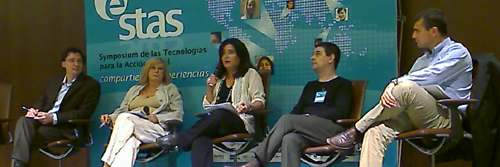e-STAS is a Symposium about the Technologies for the Social Action, with an international and multi-stakeholder nature, where all the agents implicated in the development and implementation of the ICT (NGO’s, Local authorities, Universities, Companies and Media) are appointed in an aim to promote, foster and adapt the use of the ICT for the social action.
Here come my notes for session VII (notes at random, grouped by speaker, but not necessarily in chronological order)

Left to right: Fabio Nascimbeni, Susana Finquelievich, Georgina Cisquella (moderator), Enrique Varela, Julio Andrade
Susana Finquelieveich, Links
There’s always been social networks. But now, thanks to the Internet, they can have a wider reach.
It’s important that sponsors and international agencies understand the usefulness of social networks and support them, both politically and economically.
Fabio Nascimbeni, Vit@lis
Some social networks have been born on the Internet. They are not “bone and flesh” networks gone digital, but digitally born.
The network is making possible that things that wouldn’t happen can actually take place, or that people that would never meet can now work together.
Networks have to be independent from the financial sources and political pressures.
Enrique Varela
Social networks have enabled conversations between different actors with different roles, e.g. nonprofits and sponsors.
We don’t have to think around technologies, but what is the problem we are facing and how should the solution look like.
Partnerships between nonprofits and firms are difficult and hard to manage, but the results are usually great if the institutions succeed at weaving the network.
Julio Andrade, City Council of Málaga
Local administrations do need to use (digital) social networks to interact with the civil society, learn from each other, work together, etc.
e-Stas 2008, Symposium on Technologies for Social Action (2008)
If you need to cite this article in a formal way (i.e. for bibliographical purposes) I dare suggest:
Peña-López, I. (2008) “e-STAS 2008 (VII). Round Table: The role of Social Networks and Citizenry to achieve Socio-Digital Inclusion” In ICTlogy,
#55, April 2008. Barcelona: ICTlogy.
Retrieved month dd, yyyy from
https://ictlogy.net/review/?p=712
Previous post: e-STAS 2008 (VI). Communications
Next post: e-STAS 2008 (VIII). Last reflections. On access as a dependent variable.
 RSS feed for comments on this post.
TrackBack URI
RSS feed for comments on this post.
TrackBack URI

